- Home
- Michael Chabon
Kingdom of Olives and Ash: Writers Confront the Occupation Page 28
Kingdom of Olives and Ash: Writers Confront the Occupation Read online
Page 28
I have not forgotten the modernist concrete barrier bulletproofing the road winding over into Hebron. And I will not forget, cannot forget, the madness of what I saw there. Family homes turned into lookout posts. Front steps opening onto streets where their owners may not go. The guts of once busy shops and markets left flapping in the sun. The bullet holes and furrowed walls where tanks have squeezed improbably through. Patrolled by soldiers and the ever voluble settlers eager to impress their point of view. The places where life was, children played, people called to each other and thought of as home and, once perhaps contentedly, as the boundary of their whole world, stand empty. Desolate. Turned into rattraps now, and cages. Sealed behind soldered doors. Closed off for hours, then days, then years at a time. Street names mauled and replaced so the very memory of their ever having existed becomes debatable, then fabled, then gone. The sheer effort, in this place, to make history die. I stood on a hill, looking out across the city, listening carefully for its particular sound, but there was such quiet. I have never heard so many people live in silence before. Later, down again and at a checkpoint to the other side, the man who’d volunteered to guide us through lost his rag with the young soldiers who had decided to make us, for no discernible reason, wait. In the heat. And I got so polite inside myself. Willed him to stop being antagonistic with them. Forgot how fast I like to walk. Hate security in airports or the time lost in call centre queues while he, along with everyone he knows, spends his life waiting for that arbitrary Stop to be Go. Not ten minutes. Hours of the day. Years of life. Wasting in the delay.
Inside, finally, and there was the sound. The press of people herded into too little room, and open eared I went through the streets. Only after a while thinking to look up and consider the mesh that was the sky. Covered in filth. Bags of shit. Bottles and nappies and every kind of rubbish in every place, leaking in, dripping through. Thrown down on people from the bright white settlements built above, on top of them, in buildings that were once their own; surely a far cry and gleaming domestic heaven when viewed from the squalor inflicted below. The indecency of it. The disgrace. Can even the fervent belief that such mass dispossession is a gift from God really justify this? Then the screaming of the settlers waiting for us when we emerged from the checkpoint on the other side, best summarised as “You’ve been talking to terrorists and liars. Your eyes do not understand what they have seen,” is overwhelming, and in one way, of course, they are right. I can make no human sense of what I witnessed on those streets. But I know my eyes saw what they did and can never unsee it again.
Now, though, I am driving down to Jericho, and, for the first time, the country opens wide. All week, until now, the rain has poured down and today is blue skies with no cloud as far as the mountains in front of us, then away into Jordan on our right. And if my boots are still wet with the mud of Susiya and Umm al-Khair, I can live with that. The harping cold of those remnants of villages is slipping off me now. I wonder how it is today for the toddlers I saw there. Life doesn’t just look worse in the rain. Yesterday their parents noticed a car stopping nearby for its driver to make notes and knew this meant someone would soon be back to demolish their homes again. As I took a photo of a man’s goats grazing in the rubble of what had been his house, he said “Hey, take a picture of my son.” But when I did, he said “No, where his kitchen should be, where his toilet was.” When he put the child down, his baby shoes soaked up the wet from the tile fragments surrounding the skeletal remains of a squat loo and the thin line of debris dividing it from where a kitchen must have been. And I took the photo. And looked at the little sodden feet. I couldn’t imagine how they would ever get dry in that tiny tin shack where this little boy, along with his whole family, now lived, and they hoped would not be torn down again soon. From where I stood I could easily see into the warm, well-built homes of the settlers beside, who were obliging their close neighbours to live in this foulness, who must’ve looked out every day through the well-fitted glass of their comfortable kitchens onto this shameful site. And although I was familiar now with the many justifications for why the settlers have decided their fellow human beings deserve to live this way, why Palestinians have brought this situation on themselves by insisting on their right to remain on their own land, I did not understand. The ideology, the tacit encouragement—to support its own territorial ends—of the state, the problems solved by attempting to force outward migration, even the opportunist’s chance for land, my brain knows how to get around. What I do not understand is the human choice settlers make and the certainty with which they seem able to choose for others what they would never choose for themselves. Presumably it helps that a state machine, which has lost the run of itself, works only in their favour.
But we are nearing Jericho, talking about all kinds of things in the car. Two women in the front, mother and daughter. Mother just a few years older than me and her daughter in her late teens. Me and the translator in the back. Their English though is excellent, a product of the elder’s childhood exile in the United States. I can hardly imagine her history, growing up in the South and being “the brownest people on the street.” But when the Klan planted a burning cross on their lawn, her father—a former member of the Popular Front for the Liberation of Palestine—went out and blew it up. And we laugh about programmes on TV, especially the Curb Your Enthusiasm episode called “Palestinian Chicken.” She likes that one a lot. I ask about marriage. “I met my husband during the first intifada,” she says. “I was in my teens, he was throwing stones, and I thought that was kind of sexy.” I’m pretty sure in my teens I would have too. She’d like her daughter to marry but expects her to choose. Education is vital. Her daughter also thinks so. They are liberal, articulate, wearing jeans. Her daughter wore a headscarf for a while, for solidarity. She doesn’t anymore. She doesn’t think it means that now. And then they talk about their cousin. A boy of only sixteen. Kidnapped, beaten, murdered, burned alive. The injustice of what happened in the investigation of the crime. Undercover agents beating up other family members, then detaining them without charge. The boy’s own parents accused of perpetrating the murder themselves, as a homophobic “honour killing.” The stress of the state-serving media slander and, on top of all this, the awfulness of the grief itself. There is nothing I can say. I have never known anyone killed in this way. I have never known a family who has had to endure this. I wonder how much comfort they take from the justice that was finally wrung from the state. Maximum sentences are what the perpetrators must live through now but change nothing of what the victim’s family must live with, and without. As I listen I am so conscious that for me this is just one more terrible thread in a pattern I am still learning how to read. But for them, it is a nightmare that will never go away, an inescapable agony at the very centre of their lives. How must it be to wake every day to the knowledge that they, along with their whole society, have no place of refuge, nor expectation of respite, from these deep injustices and horrific crimes? All that is human in me recoils from this. Does not want to believe there are those who seek to justify it, who feel it can be justified, that the modern state—which has forced itself into the position to preside over such abuses—willingly continues to do so and then blames its victims too.
But “I don’t need your tears” a woman in Nabi Saleh said, after I’d watched a home video of one of her relatives dying horribly, bloodily, from a tear gas canister being fired into his face. And it’s true, the emotion of well-meaning outsiders like me is of no worth. It’s certainly a hindrance, once descended into hysteria and insults on the Web, to reaching those who must, most urgently, be affected. Those people on the other side whose rejection of occupation would count, whose voices would have to be heard, who need all our encouragement to risk becoming more than the sum of their—not always unreasonable—fears.
So we go through Jericho and see its giant key painted in white with the words We will return . . . Then on out into the Jordan Valley to Ras al-’Oja and the Bedouin women li
ving there.
In plastic chairs we sit in a ring arranged under trees. Women in colourful hijabs, old men smoking, and glasses of tea. The huts they live in scarcely more than that. Carpets on mud floors. Breeze blocks covered in tarpaulin and plastic. Their lowness keeping out the wind and the sun. Chickens and goats running around. The heat almost kills me but balmy for them and I’m unsure where to start. I’ve inkling enough though that what I thought I’d ask won’t be answered in a mixed crowd. Under occupation, I’ve learned, there is no space for the personal, not when speaking to foreigners anyway. There is barely air. So instead I ask the women to tell me about their day to day. What’s a normal one? Milk the goats. Bake bread. Get the children out to school. What kind of education do you have? University level. What, all of you? Of course. Women as well? Yes. And they are surprised that I am. When we were chased off our ancestral lands in forty-eight, they explain, some of us fled to Jordan but those who remained decided that, as a people, we must educate ourselves. Our level of education is a beacon to the Arab world. Today I hear this time and again. But the conversation turns and they tease about finding me a husband among them. When I say I have one, and a child, a woman my age says she has eight and is the first wife of three. She says she doesn’t mind because the others do things her way. The other wives agree, and I’m pretty sure I would too if she were in charge of me. With her husband sitting there, playing henpecked though, I know I won’t learn much more. What happens if a marriage is unhappy? The family sorts it out, of course. So I look out across the fields. The season is still green but, not far off, there stands a white concrete building with its tell-tale antennae. Is that a settler outpost? I ask. And it is. They will be coming soon. What do you think about that? What can we think? We are afraid. This village is under demolition orders already, while they have every comfort the state can provide. Mains water and electricity, while we are beaten for trying to collect water at all. The violence always and the threat of it. “Would it ever be possible, in the future, to integrate?” “We’d live with them,” they say. “But they won’t live with us.” It’s a line I’ve heard many times this week, along with the—surprising to me—preference for a single state. It’s explained simply, and of course makes sense, this is their homeland, all of it. How can they give up on their dream of the freedom to travel it? See the cities they’ve not seen in years. Catch up with friends and family members. Go paddle with their children on the beach in Jaffa. This is a country they love, so I ask about love. In this terrible situation, what can it mean, love of country, family, sister-wives even? “It’s everything,” the first wife says. “For me, love is everything.”
Later we go to another village. It’s been arranged that I’ll speak to a group of local women and the leader of the women’s council there. After I’ve been welcomed, but before I am left alone, the man who arranged the introduction advises me not to “ask about the occupation. The women will be too intimidated to speak openly about that.” But the very minute he closes the door, that’s exactly where they start. There is no work in this village and their lands are being eaten out from under their feet by the ever-widening jaws of the settlement. And although the settlement grows daily, the villagers themselves have no right to build. They must cram what breeze-block floors they can onto their already crumbling houses beneath. So families are crowded on top of each other in dangerous buildings. Freezing in winter and boiling in the sun. No adequate sewage, clean water, or medical attention. An elegant and eloquent young woman says, “I’m a trained social worker but I spend my life picking onions.” With their own lands appropriated and the fathers of their children unable to find jobs, or forced into outward migration, these women’s only available option is to work as manual labourers in the settlements nearby. It’s a thirty-minute ride just to get there every day, in a trailer, open to the elements rain or shine. Every woman in this room, young and old, regardless of education, family situation, or physical ability, must pick and pack and clean onions to make ends barely meet. Six a.m. to two p.m. for ninety shekels, from which the overseer extracts his own commission. Fifteen-minute break a day, is all. No health care provision or compensation for those injured on the job. And the work is riddling them with health problems. Carpal tunnel syndrome and what the constant bending does to the discs in their backs. Breathing problems from the constant intake of unfiltered, noxious air in an enclosed space. And these are greenhouses they work in, so they’re hot. No job security or benefits, of course, and what causes them all great distress is being forced to leave their young children home alone, constantly. One woman says, “I cannot go on. My health is broken. I can no longer work. I am in constant physical pain and I have only come out to ask if you can do something. I beg you, please do something for me.” She becomes so agitated and I am so obviously useless that she has to leave.
For a while there was an NGO out of Bethlehem helping them start a microenterprise of their own, in the hope of providing an alternative source of income to the hated settlement work. They set up a wedding business. Providing chairs. Photography. Catering. Music. For a time it worked and hope happened, then the NGO moved on. Without the experience of keeping a business going, it folded soon after that. For a while they talk about the dearth of leadership, about the wilful passivity of the West, about Arafat and what he made them dream, then how he allowed those dreams to be betrayed. And what lifts, like mist, is the rage in them. The visible rage at this maze which they find themselves trapped in. Rage at the waste of their good minds, and their talents forcibly left to rot. The waste of the painstakingly acquired educations and skills which can bring them no benefit. The sheer frustration of ambitions that have nowhere to go and, because of that, living constantly in the shadow of what most people would consider to be unlivable: the unending decay of hope.
In a coffeehouse in Ramallah, I sit with three women, all of whom are smoking like trains. They have agreed to meet me to help fill in the gaps. They are long-term advocates for Palestinian women’s rights. Passionate but also dispassionate. Apologetic that some of their number have backed out because they feared “breaking the BDS by meeting you.” When I protest that I’m not Israeli and this project receives no government funding from there, they say they know, and think it is a shame, but the social repercussions of falling foul of the BDS movement are so great that some people have become afraid of speaking out to foreigners who are involved in projects that include Israelis. I think this is an unfortunate consequence and am all the more grateful to those who have come. They are all highly educated, liberal, without headscarves on and scornful of their fellow female activists who have started to don them. They are, in fact, pretty enraged that those in headscarves lay claim to a superior commitment to the cause. They see it as a sign of how women have been conned into forgoing their battle for equal rights until the greater war has been won. So here is where I hear about domestic abuse and its victims’ near-total lack of recourse. Even where there are shelters, the occupation regime’s movement restrictions make the victims’ ability to access them virtually nil. Contraception is available for married women, but hard to choose unless their husbands are in agreement. As for the rest, “sex before marriage does not exist.” So for any woman unlucky enough to find herself pregnant and unmarried, the future is very bleak indeed. “Honour killings” are a real threat. Abortion is expensive here and the quality of treatment often poor. They say these are problems within the purview of the Palestinian Authority to address but it chooses not to, and even when it has—as in a recent law forbidding honour killings—implementation rarely moves beyond lip service. Fighting for an end to the occupation is the only struggle the PA will admit. But these women think Hamas has destroyed the struggle anyway, by pairing the legitimate fight for rights, justice, and self-determination with fundamentalist ideology. That was never what they were fighting for, and they object to the perception that this is what they are fighting for now. Before I leave them I ask that most awkward and impossible of ques
tions: What can I do? Nothing, they say, except go home and tell everyone what you have seen and heard.
On my last day I walk around West Jerusalem. It’s a world I nearly know. People just being, getting on with their lives, and I’ve half-stopped noticing the guns on display everywhere. It’s only when I arrive at the protest known as the Women in Black that I’m slammed back to reality again. Every Friday, for twenty-seven years, this group of Jewish Israeli women have come to silently protest against the occupation. They are mostly elderly now and all they do is stand holding placards made in the shape of black hands with the words stop the occupation printed on them. I stand with them for, maybe, an hour, the last one of that day. And the fury this simple act of defiance provokes is incredible to behold. Drivers slow down to give the finger, honk their horns, and shout “Traitor!” at them. A man—young enough to be most of the women’s middle-aged son—stands on the opposite curb and for the whole hour shouts how he hopes that they get raped. That rape is what they deserve. This is normal, they say, we’re used to it, over the years we’ve had much worse. I admire their tenacity and their self-control. Occasionally he is flanked by young soldiers who smirk but do not speak. He garners slaps on the back and sometimes raises likewise vocal companions from the passing crowds. And he is completely comfortable where he stands, screaming these obscenities in public to a crowd of women who are silently asking their government to stop their illegal occupation, nothing more. The hate they provoke though, has much to say, I think, about their fellow citizens’ consciences. Because everyone is implicated here; at one time or another, most have served. It reminds me of what another activist said, earlier in the day; that this visceral anger is a good sign because it means, somewhere inside, these angry people are ashamed, and that, at least, is a start.

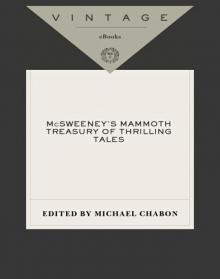 McSweeney's Mammoth Treasury of Thrilling Tales
McSweeney's Mammoth Treasury of Thrilling Tales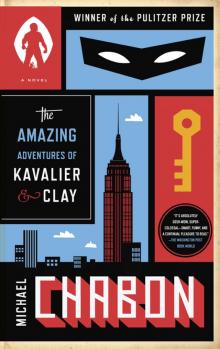 The Amazing Adventures of Kavalier & Clay
The Amazing Adventures of Kavalier & Clay The Yiddish Policemen's Union
The Yiddish Policemen's Union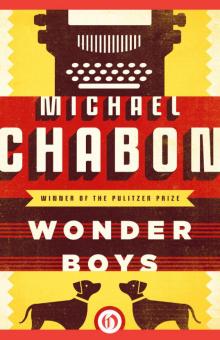 Wonder Boys
Wonder Boys Manhood for Amateurs
Manhood for Amateurs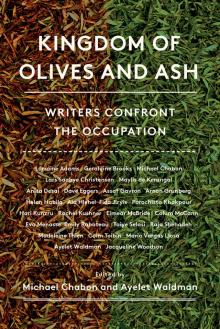 Kingdom of Olives and Ash: Writers Confront the Occupation
Kingdom of Olives and Ash: Writers Confront the Occupation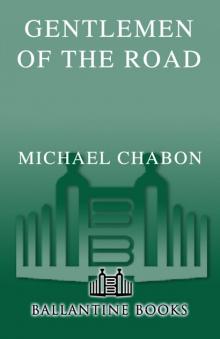 Gentlemen of the Road: A Tale of Adventure
Gentlemen of the Road: A Tale of Adventure A Model World and Other Stories
A Model World and Other Stories Pops: Fatherhood in Pieces
Pops: Fatherhood in Pieces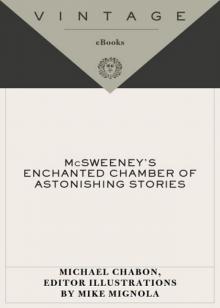 McSweeney's Enchanted Chamber of Astonishing Stories
McSweeney's Enchanted Chamber of Astonishing Stories Summerland
Summerland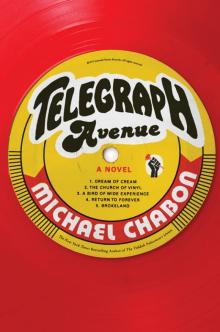 Telegraph Avenue
Telegraph Avenue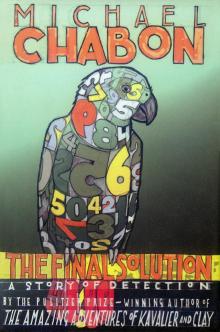 The Final Solution
The Final Solution The Mysteries of Pittsburgh
The Mysteries of Pittsburgh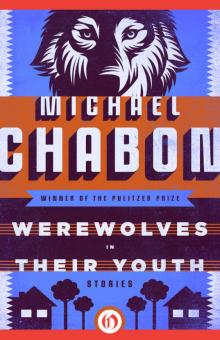 Werewolves in Their Youth
Werewolves in Their Youth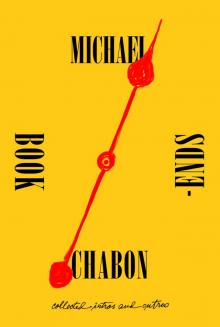 Bookends
Bookends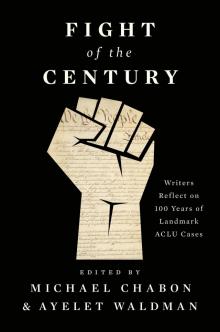 Fight of the Century
Fight of the Century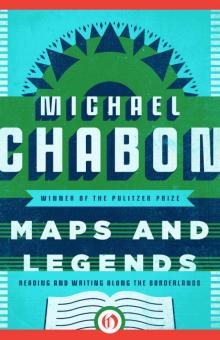 Maps and Legends
Maps and Legends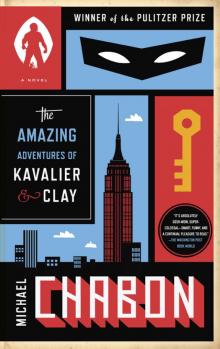 The Amazing Adventures of Kavalier & Clay (with bonus content)
The Amazing Adventures of Kavalier & Clay (with bonus content)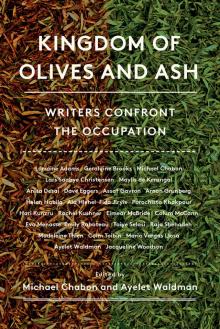 Kingdom of Olives and Ash
Kingdom of Olives and Ash Pops
Pops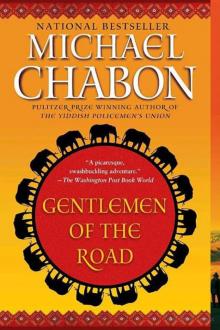 Gentlemen of the Road
Gentlemen of the Road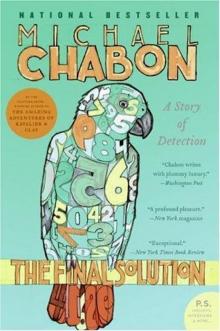 The Final Solution: A Story of Detection
The Final Solution: A Story of Detection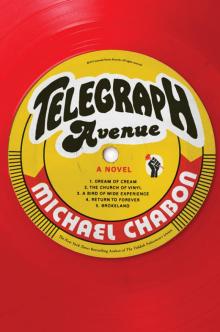 Telegraph Avenue: A Novel
Telegraph Avenue: A Novel